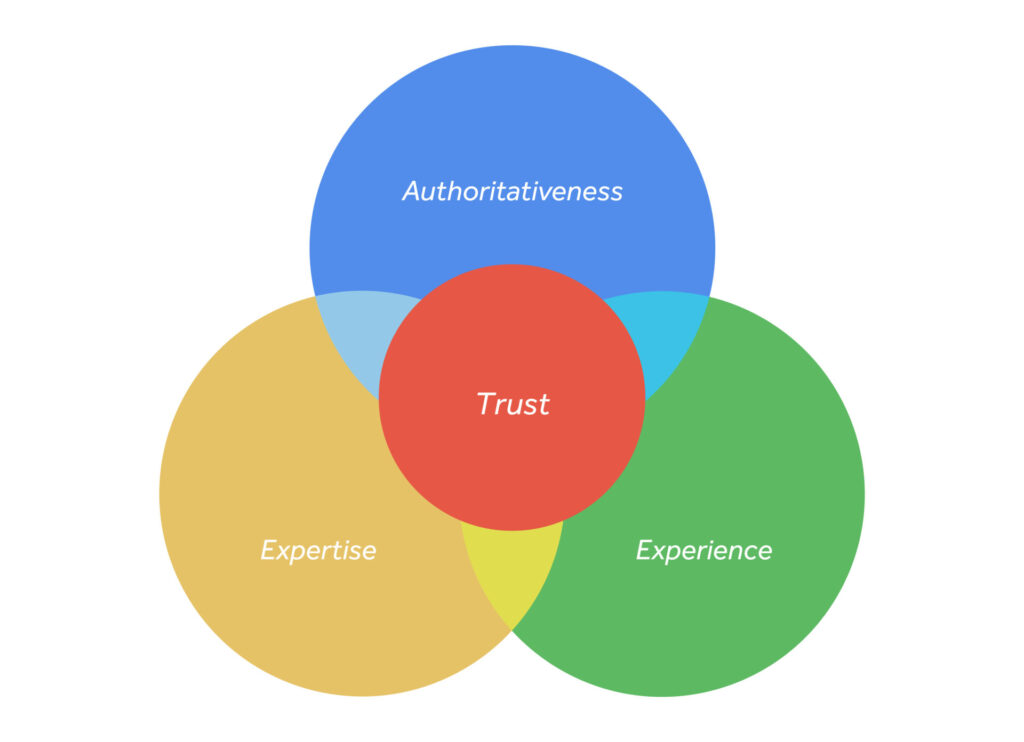As we move deeper into the second half of 2024, now is a great time to reflect on some of the changes we’ve seen in SEO and evaluate what these changes can mean for web development and digital marketing best practices moving forward.
SEO Change #1: Search Quality Criteria Have Upgraded From E-A-T to E-E-A-T
For years now, SEO raters have used the acronym, E-A-T, as a guideline to determine a website content’s usability and effectiveness and rate its quality for Google’s algorithm:
E – Expertise
A – Authoritativeness
T – Trustworthiness
But now there is a new component added to the acronym:
E – Experience
E-E-A-T is not a direct ranking factor. However, when a site’s content is optimized to demonstrate qualities and attributes that signify the creator’s experience, expertise, authoritativeness, and trustworthiness, Google algorithms and users are more likely to deem the site as high-quality and credible, which then boosts the likelihood of ranking high on the SERPS (search engine results pages). As a result, marketers, website copywriters, content creators, and others use the E-E-A-T concept to evaluate a website’s search quality and improve/optimize its SEO value.

First-Hand Experience, Not User Experience*
User experience (UX) is the driving force behind most, if not all, web design trends and standards, but that’s not what this addition is referring to—well, not directly. The experience in E-E-A-T refers to the first-hand experience authors and content creators have regarding the content they produce and the topics they cover. When digital content demonstrates the author’s hands-on experience with a topic, along with their expertise, authority, and trustworthiness, the author automatically boosts their efforts to improve the user experience.
*Note that user experience is still crucial to consider in your web design—in fact, it should be the foundation of your web design and digital strategies, and it can be enhanced through the first-hand experience you demonstrate when addressing a topic on your website.
It’s one thing to research a topic and write about it. It’s another thing entirely to have hands-on experience with the topic. Google understands that having direct, first-hand experience allows creators to provide stronger, more informed content, which better serves users. While Google considers the creator’s experience in content for all topics, it is especially critical when it comes to topics like health and finances (sometimes referred to a “your money and your life” topics, or YMYL), since content in both categories can have a positive or negative impact on a user’s health, safety, financial situation, and more.
Why E-E-A-T Matters to SEO
People want to know that the information they receive from Google is genuine, trustworthy, and high-quality. No one is looking for mass-produced, non-credible, and low-value content, which can be tricky to evaluate, especially in the new age of AI. Artificial intelligence is becoming a more prominent aspect of our online experiences, but AI is only as high-quality as the sources it uses to serve a user.
Having content that demonstrates experience, expertise, and authority gives Google more confidence when showing your content in the SERPs or relying on your content for its Search Generative Experience (more on that later).
In upgrading from E-A-T to E-E-A-T, Google has shown marketers and others the importance of emphasizing credibility, authority, and real-world experience in content regarding whatever topic is being covered. When all four are established with the content, users are likely to place trust in the content they are engaging with and in the creator/website, which is huge for a site’s search quality. In fact, trustworthiness is the leading factor Google considers for a website. According to the majority of raters, pages that are not seen as trustworthy have a naturally low E-E-A-T after assessing experience, expertise, and authoritativeness.
That means your content should now demonstrate the components of E-E-A-T to establish trust and enhance your SEO value with Google’s algorithm, which you can do through the following efforts:
Experience
If your site features a blog, emphasize the experience that the author(s) behind the posts have by displaying the author’s name and providing an author bio. Whether you feature a blog or not, you can offer a peak “behind the scenes” through photos, videos, and written content. You can also directly refer to your experience in any videos or text-based content.
Expertise
Create content that dives deep into the subject matter and offers accurate, relevant information. You can also include citations and links to verified or reputable sources.
Authoritativeness
Maintain a helpful, informative blog, updating it regularly with valuable, relevant content. Also, gain coverage and mentions from relevant websites to strengthen your presence within your industry or market.
Trustworthiness
Be genuine with your information, show the human side of your business and who is behind your website, and be transparent and ethical in your web/content practices.
SEO Change #2: Google’s New AI-Powered Search Experience
You have probably noticed that a number of your Google searches now show an AI-powered overview covering the query you submitted before you see the paid and organic search results. This is Google’s new AI-powered search generative experience (SGE), known as the AI Overview (AIO). If you use Bing, you have noticed its AI system called Copilot. Both systems and others like them pull information from relevant sources to provide a quick answer to your questions or offer a high-view description of whatever you want to know more about.
For example, if you were to ask Google, “When did Hawaii become part of the US,” the AI Overview will not only provide the date (August 21, 1959), but it will pull from relevant sources to give you a brief explanation as to why it became the United States’ 50th state. It will also display two or three “source cards” with links to the web pages used so you can look further into the topic.
Why SGE/AI Overview Matters to SEO
Google’s SGE is already changing the way users interact with Google. It’s more conversational, provides more concise information to match what the user is looking for, and cuts the duration of a user’s quest for knowledge down significantly. SGE creates a more intuitive, interactive search for users. Plus, it’s leading to more zero-click searches.
- Zero-click search – A search wherein the user submits a query to the search engine but never clicks on any of the source cards, paid ads, or organic search results displayed on the page. The AI Overview and other SERP features provide the details the user is looking for, allowing them to leave the page without clicking on anything.
This does not mean it’s time to upend your entire website and redo it to optimize for SGE. In some searches, the AI Overview will yield a satisfactory response wherein the user will not feel the need to scroll to the paid or organic search results for more information. But in many other searches, users will still scroll for additional information or to find sources that offer more details, allow for fact-checking, serve as a cross-reference, and more. It’s important to keep up with traditional technical and strategic SEO best practices and continually look for opportunities to optimize your web content further using the SEO strategies and practices you already know.
However, this AI-powered change does present an opportunity to add SGE-optimization (also called generative engine optimization, or GEO) to your content and stive to be a source used by SGE in overviews that are relevant to your business or web presence.
Ways to optimize for SGE are actually very similar to current SEO best practices. These tactics include:
- Earning backlinks from reputable sites and sources
- Creating content that is clear, concise, and easy to read
- Displaying images with clear, well-written alt text and file names
- Uploading YouTube videos with optimized titles and video descriptions
- Strengthening your web content’s E-E-A-T score
- Becoming an authority in your market or industry by regularly posting relevant, accurate, and useful content
When considering the format for your content and aiming to make it concise and readable, keep in mind the four formats Google prefers to pull from:
- Clear, concise definitions—Millions of Google searches start with either of the following two-word phrases: “What is…” and “What does…” The results that the user is likely hoping for is a clear, short, easy-to-understand definition that briefly explains the concept of whatever it is they want to know more about, and that is precisely what Google looks for when searching for a source/information to present to the user.
- Images—In many searches where AI Overview is featured, the overview will include an image to accompany the information presented. Google will scan for relevant file names, well-written alt text, and on-page context clues to determine an image’s relevance in the AI Overview and other SERP features.
- Lists—Users love lists, which means Google loves lists. When pulling content to present via the AI Overview, SGE will look for relevant lists that help satisfy the search.
- Videos—Sometimes, a YouTube video can accompany an AI Overview or be used as part of the information SGE pulls for the overview, if applicable. If citing a video, SGE will rely on the video’s title and description.
The world of SEO is big, complex, and constantly evolving. Partner with the pros at M&R Marketing to stay informed about current and new GEO and SEO best practices.
SEO is an ever-evolving, ever-crucial component of digital marketing, but staying ahead of the changes to SEO can be a challenge. At M&R, we remain focused on the future of SEO and understand what each change can mean for businesses like yours now and in the future. Your SEO strategies can make or break your online success—optimize yours with M&R on your side.
Call 478-621-4491 or contact one of our business development managers today to discover how our SEO solutions can boost your business and online presence.
Detailed Marketing Deets
Want some profound insight into all things marketing? Check out our Definitive Guide Series for detailed information, tips, and advice regarding:

